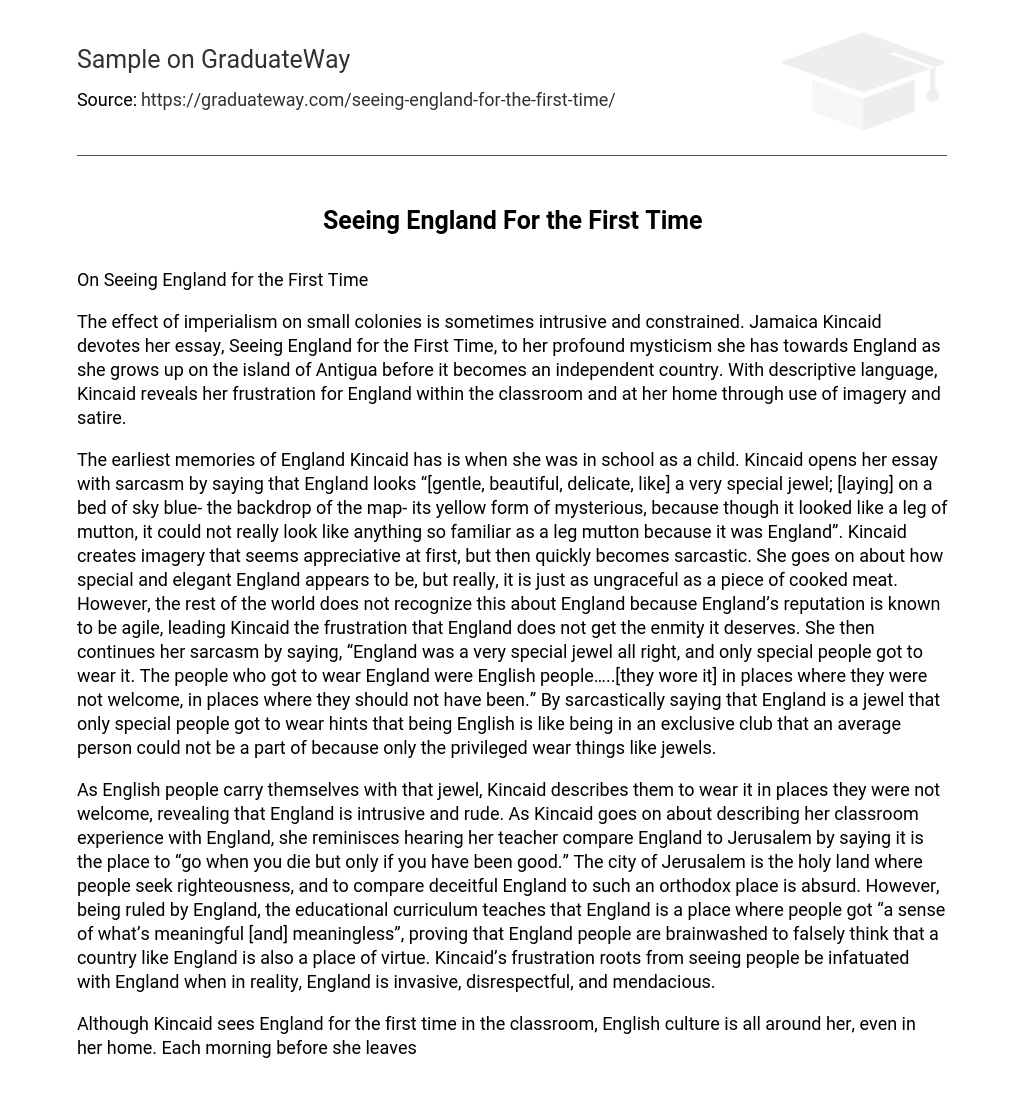Upon the initial observation of England
In her essay, “Seeing England for the First Time,” Jamaica Kincaid discusses the impact of imperialism on small colonies. Kincaid, who grew up in Antigua before it gained independence, expresses her deep fascination with England. However, she also recognizes the intrusive and restrictive nature of imperialism. Through vivid descriptions and the use of imagery and satire, Kincaid conveys her frustration with England both in the classroom and in her own home.
Kincaid sarcastically opens her essay by describing England as a gentle, beautiful, and delicate jewel. She compares it to a leg of mutton but notes that it cannot truly resemble something as familiar as cooked meat. Despite its ungraceful nature, the rest of the world fails to recognize this, as England’s reputation is known to be agile. Kincaid expresses frustration that England does not receive the enmity it deserves. She continues her sarcasm by suggesting that only special people, specifically English people, get to “wear” England. This implies that being English is like belonging to an exclusive club for the privileged.
Describing the English people’s demeanor as they carry themselves with self-importance, Kincaid asserts that they flaunt their superiority in places where they are not welcomed, suggesting that England is intrusive and impolite. Kincaid reminisces about a classroom experience where her teacher likened England to Jerusalem, describing it as a destination for the righteous in the afterlife. This comparison between England, known for its deceitfulness, and the sacred city of Jerusalem is utterly absurd. Nevertheless, under England’s rule, the educational curriculum indoctrinates the idea that England provides a sense of both meaning and meaninglessness. This shows that the English people have been influenced to wrongly perceive their country as a place of virtue. Kincaid’s frustration stems from witnessing others’ infatuation with England when in reality it is invasive, disrespectful, and dishonest.
Even though Kincaid encounters England for the first time in the classroom, English culture permeates her life, even within her own home. Kincaid begins her day with a breakfast that mirrors the English lifestyle, consisting of half a grapefruit, oat porridge, bread and butter with cheese, and a cup of cocoa. Through this description of her morning meal, Kincaid satirizes the extravagant English lifestyle and demonstrates how profoundly her life is influenced by English customs. Notably, she points out that each item in her home has a “Made in England” label, which serves as a mockery and ironic reminder that despite residing in an English colony, she is not part of the privileged exclusivity of living in England itself. Kincaid acknowledges that while English culture surrounds her, she is grateful that she will never truly become English. This realization leads to feelings of suffocation and annoyance towards the intrusive and disrespectful English culture that has shaped her upbringing.
Despite its isolation from England, Antigua is unable to escape the influence of English customs. This influence is constant, from the classroom where students learn about England, to the expectations at home to behave, dress, and eat like an English person. Individuality and Antiguan culture are disregarded in favor of conforming to English norms. Jamaica Kincaid sees through this ignorance and forms her own opinions about England, viewing it as invasive, brainwashing, and disingenuous. She believes that England smothers Antigua, preventing it from maintaining its originality. Kincaid expresses her frustration through satire, suggesting that imperialism is harmful as it imposes the monarch’s customs on indigenous countries.





